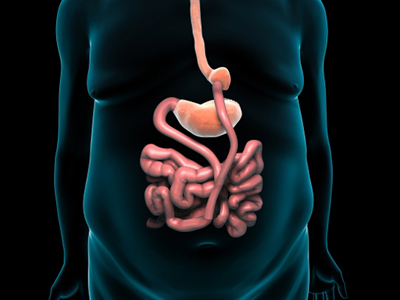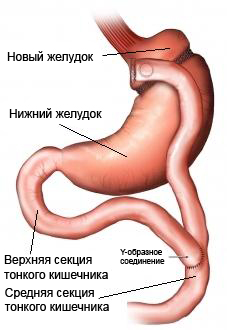Bariatricheskaya surgery – obhodnoj želudočnyj anastomoses per Ru – laparoscopic surgery
Description gastric bypass Roux
Obhodnoj želudočnyj anastomoses per Ru – operation, performed for obesity. It changes the stomach and small intestine, to cause weight loss:
- Limitation meal – It creates a small pouch, which performs the function of the stomach. Its size does not allow to eat large amounts of food at one time;
- Limiting the absorption of food nutrients – food bypasses the initial portion of the small intestine, which usually absorbs most nutrients.

The reasons for performing gastric bypass Roux
The operation is used for severe obesity. Doctors use indicator, called the body mass index (BMI), to determine the degree of obesity. Normal BMI – 18.5-25.
Gastric Bypass – the possibility of weight loss for people with the following indicators:
- BMI greater than 40;
- BMI 35-39.9 and life-threatening diseases, such as heart disease or diabetes;
- BMI 35-39.9 and with severe disabilities, which impact on employment, mobility, family life.
The success of gastric bypass surgery depends on further lifestyles. With the right approach would be a significant improvement in health:
- Long-term weight reduction;
- Disappear many obesity-related diseases (eg, glucose intolerance, diabetes, sleep apnea, high blood pressure, Lower Cholesterol);
- There will improve mobility and increase strength;
- Improve mood, self-esteem, quality of life;
- It will reduced risk of death from cardiovascular disease (eg, heart attack, stroke) and other reasons.
Possible complications when performing laparoscopic Roux-en-Y gastric bypass surgery
Before, how to perform the operation, you need to know about possible complications, which may include:
- Nutritional deficiencies – You will need to take vitamins, to get enough vitamin B12, iron and calcium;
- Bleeding;
- Infection;
- The formation of blood clots;
- Herniation;
- Bowel obstruction;
- Disconnecting staples, causing leakage of gastric fluids into the abdominal cavity;
- Diarrhea, abdominal cramping and vomiting;
- Dumping – It occurs after eating sweets, when the food through the small intestine is moving too fast and cause sweating, fatigue, dizziness, convulsions, diarrhea;
- Complications of general anesthesia;
- Death – occurs in less than 1% patients.
Factors, that may increase the risk of complications include:
- Smoking;
- The presence of chronic diseases (eg, kidney disease);
- Diabetes;
- Old age;
- Heart or lung disease;
- Bleeding or clotting disorders.
How is laparoscopic surgery gastric bypass Roux?
Preparing for Surgery
Each method of bariatric surgery has specific requirements. Before performing the current operation, probably, You need::
- A thorough medical examination and analysis of the medical history;
- Attempts to lose weight (about 10%) through the use of diet drugs;
- Consultation with a dietitian;
- Evaluation of Mental Health.
Before surgery:
- The patient may be asked to stop taking certain medicines a week before the procedure,:
- Aspirin or other anti-inflammatory drugs;
- Blood thinners, such as warfarin, clopidogrel (Plaviks);
- Do not take any new medications or supplements without consulting your doctor;
- It is necessary to organize a trip to and from the hospital;
- It is necessary to organize a home help for the recovery period;
- Before the operation may need to take antibiotics;
- We need to take laxatives and / or an enema, to cleanse the bowel;
- On the night before the operation, you can only have a light meal. Do not eat or drink anything after midnight, unless otherwise indicated doctor.
- We need to take a shower or bath in the morning before surgery.
Anesthesia
During the operation using general anesthesia. During the operation, the patient is asleep.
Description of the procedure
To prepare the patient for surgery, Nurse enters venous catheter in the arm of the operated. The patient will be able to get through it fluids and medications during the procedure. The doctor will put a tube for breathing through the mouth into the throat. This will help the patient breathe during surgery. Also, a catheter is inserted into the bladder, to divert urine.
The doctor will make several small incisions in the abdomen. It will be pumped gas, to facilitate visibility inside. A laparoscope and surgical tools will be inserted into the incisions. Laparoscope – special medical tool with a tiny camera and a light source at the end of. It sends images of the abdominal cavity on a monitor in the operating room. The doctor performs, considering the operated area on this monitor.
The doctor will use surgical staples, to create a small pouch at the top of the stomach, which can accommodate about 250-300 gram of food. It will be a new, lower stomach. A normal stomach can hold up to half a kilogram of food.
Then, Doctor cuts the small intestine and attaches it to the new stomach. With the intestinal bypass moves food from the stomach to the new middle section of the small intestine, bypassing the normal stomach and the upper section of the small intestine.
Finally, the upper section of the small intestine is attached to the middle section of the small intestine. This allows fluid, which makes the old stomach, down from the upper section of the small intestine in the middle section.
Once bypass is completed, incisions are closed staples or stitches sewn.
It should be borne in mind, In some cases,, a doctor must switch to open surgery. During open surgery, he will make a large incision in the abdomen, to directly see the internal organs.

After the procedure
The patient goes to the recovery room for monitoring vital functions. Also on the need to introduce painkillers.
How long will the surgery?
About two hours.
Will it hurt?
Anesthesia prevents pain during surgery. Patients experience pain or soreness at the incision during recovery. Your doctor may prescribe medication, to ease the pain.
Time spent in hospital
The usual length of stay is 2-5 days. If complications arise, length of stay in the hospital can be extended.
Postoperative care after laparoscopic gastric bypass Roux
In the hospital
While in the hospital, the following procedure:
- Provided painkillers;
- Diet:
- On the day of the operation can not be anything to eat and drink;
- The next day after the operation is carried out X-ray examination for leakage of gastric operated seats. To do this, the patient is given a drink a special liquid, then performed an x-ray. If the test is positive, every 20 min available on 30 ml of culture liquid. If leaks are found, the power will be produced by intravenous;
- On the second day after surgery, you can take 1-2 tablespoons of pureed food or 30-50 ml of fluid every 20 minutes;
- While in the hospital, patient, it is desirable to do the following:
- Use a spirometer, to take deep breaths. This helps prevent problems with light;
- It is necessary to wear elastic surgical stockings to improve blood flow in the legs;
- Slowly walk every day.
Nursing homes
Be sure to follow your doctor's instructions. It is necessary to immediately start a healthy lifestyle and get rid of bad habits.
After operation:
- We need to ask the doctor about, when it is safe to shower, bathe or expose the surgical site to water;
- The period of recovery after surgery for gastric bypass surgery – 2-6 weeks;
- It is impossible to drive or lift anything heavy, until the doctor says it's safe. It may take up to two weeks or more;
- After surgery possible emotional ups and downs of mood;
- We need to meet regularly with your doctor to monitor and support.
The new stomach is the size of a small egg, allowing you to quickly reach satiety. Thus, you need to take very small amounts and eat very slowly:
- We need to start with 4-6 meals per day 50-80 grams at a time;
- First 4-6 weeks after surgery, all food must be pureed into a puree;
- After the transition to solid food, it should be good to chew on;
- It is necessary to consume enough protein;
- It is necessary to avoid sweets and fatty foods;
- If there is too much or too fast, This can cause severe pain or vomiting. When food intake is not necessary to hurry up.
Maybe, will have to take medication, which may include:
- Antacids;
- Painkillers;
- Vitamin and mineral supplements.
It is necessary to go to the hospital in the following cases
- Signs of infection, including fever and chills;
- Redness, edema, increase in pain, bleeding or discharge from the incision;
- Cough, breathlessness, chest pain, or severe nausea or vomiting;
- Increased abdominal pain;
- Blood in the stool;
- Problems with urination (eg, pain, burning, frequent urination, blood in urine) or inability to urinate;
- Constant nausea and / or vomiting;
- Pain and / or swelling in the legs, ykrah, feet, sudden chest pain or shortness of breath;
- Any other worrisome symptoms.
